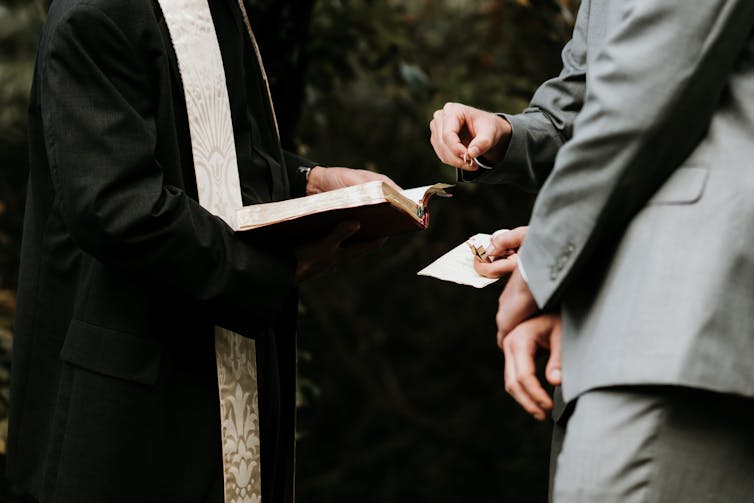Conservative amendments to same-sex marriage bill would make Australia's laws the world's weakest
- Written by Brendan Gogarty, Senior Lecturer in Law, University of Tasmania
On Monday the Senate will start debating a series of proposals to limit the scope of marriage equality reforms. If they are agreed, Australia would be the only country effectively to have wound back laws prohibiting sexual orientation discrimination after legislating to protect them.
As our comparative analysis below shows, it will also provide the largest carve-out of any country that permits same-sex marriage. Australia’s version of marriage equality would, on a global scale, be the weakest and least equal of all.
Discrimination on the grounds of belief
Recognising they would most likely lose the marriage equality survey, religious and conservative hardliners shifted their focus to limiting the scope and breadth of the marriage equality law. This was led by Liberal Senator James Paterson, who tabled a draft bill in advance of the survey result.
That bill proposed a range of exemptions for discrimination against same-sex marriage, celebration, ceremony or education on the grounds of personal belief. His bill also proposed to protect the tax-free status and public funding of religious organisations that discriminate against same-sex relationships.
The Paterson Bill was widely criticised and, after the announcement of a strong “yes” result, Paterson declared he would withdraw the bill in favour of a more popular one by Senator Dean Smith.
However, it quickly became clear that the ideas and proposals behind Paterson’s bill were not dead; rather, they had always been intended to be the source of amendments to the Dean Smith Bill. This culminated with a set of proposals for amendments from various conservative parliamentarians. These include proposed amends by:
- Senator George Brandis to allow both religious and civil celebrants to refuse to officiate SSM ceremonies and to include a declaratory statement regarding the right to freedom of religion;
- Scott Morrison to allow parents to remove children from classes where “non-traditional” marriage is being discussed; and
- Senator David Leyonhjelm to allow people to refuse commercial services to same-sex celebrations (the “wedding cake” clause).
 There are a variety of legal sources and protections for marriage equality throughout the world, but most don’t allow anyone but religious ministers to discriminate.
Photo by Peter Hershey on Unsplash
It is likely that all of Paterson’s original exemptions will be proposed in one form or another in the Senate debate this week. We have therefore included each of his original proposals in the analysis below. These are compared to other countries where same-sex marriage is legal.
There are a variety of legal sources and protections for marriage equality throughout the world, but most don’t allow anyone but religious ministers to discriminate.
Photo by Peter Hershey on Unsplash
It is likely that all of Paterson’s original exemptions will be proposed in one form or another in the Senate debate this week. We have therefore included each of his original proposals in the analysis below. These are compared to other countries where same-sex marriage is legal.
As a number of human rights lawyers and scholars have pointed out, the conservatives’ proposals misrepresent how human rights law works. The right to belief has never trumped freedom from discrimination, and never justified treating same-sex persons unequally.
Australia’s positive protection laws
In 2013 Australia passed the Sex Discrimination Amendment (Sexual Orientation, Gender Identity and Intersex Status) Act 2013. The Act implements Australia’s international human rights obligations to create a more inclusive society for all people, regardless of sexual orientation.
It places Australia within a group of countries that have enacted positive protections against discrimination on the basis of a person’s sexual orientation, gender identity and intersex status, and for same-sex couples in all areas of life (the “Positive Protections Group”).  Australia is already in a group of countries that applies international human rights law domestically to prohibit discrimination on the grounds of preference.
Photo by Abo Ngalonkulu on Unsplash
Australia is already in a group of countries that applies international human rights law domestically to prohibit discrimination on the grounds of preference.
Photo by Abo Ngalonkulu on Unsplash
Should the Parliament accept the proposed exceptions and so-called “rights” to discriminate on the grounds of belief it will effectively wind back many of these protections in a manner not seen anywhere else.
Which countries allow SSM and how?
The below map shows countries where SSM is legal – clicking on a country gives further details.
There are two primary divisions in how countries guarantee SSM.
Constitutional guarantee vs legislative groups. In Brazil, Columbia, Taiwan, South Africa and the United States, the right to same-sex marriage derives from the national constitution, meaning that their legislatures cannot make laws prohibiting SSM unions (the “constitutional guarantee” group). All other countries in the table have legislated to permit same sex marriage.
The positive protections group. Twenty-two of the countries that allow SSM have also enacted positive human rights protections into national legislation similar to those enacted in Australia in 2013. Colombia is the only country to fall both within the constitutional guarantee and positive protections groups.
Two other distinctions are relevant.
Commercial celebrant countries. All countries allow marriages to be officiated by civil ceremony; most also permit religious ceremonies. Australia, New Zealand and the United States allow commercial civil unions to be conducted, effectively creating a third category of marriage celebrants.
United States. The US is harder to put in either group because its constitutional protection for SSM comes from its Federal Constitution, but laws about marriage are made in the states. Both state and federal governments can make laws about discrimination. This means the states can carve out certain exceptions where they don’t directly conflict with federal law. So far 21 states have chosen to do this. None has as many exemptions as are proposed in Australia.
Most countries only allow limited minister of religion exemptions
A number of European countries provide no religious exemption in their marriage laws. The reason for this is that the law only recognises civil ceremonies. Germany, France and Luxembourg are among the countries where same-sex and opposite-sex couples are truly legally equal. These three positive protection group countries are closely followed by Denmark, which has a very limited exception for priests of the State Lutheran church, who may individually refuse to perform a SSM ceremony. But they cannot prohibit their churches to be used for SSM ceremonies.
The remaining countries in both SSM groups all allow religious celebrants to refuse to officiate in SSM ceremonies. However, the vast majority of these do not allow state celebrants to refuse on the grounds of belief; only Portugal and South Africa do.
 The most common exception to marriage equality is to allow religious ministers to refuse to officiate SSM ceremonies on the grounds of belief - but even that isn’t universal.
Photo by zelle duda on Unsplash
The most common exception to marriage equality is to allow religious ministers to refuse to officiate SSM ceremonies on the grounds of belief - but even that isn’t universal.
Photo by zelle duda on Unsplash
Interestingly, an unofficial poll by the Guardian last week indicated that around the same percentage that officially approved marriage equality agree that ministers of religion and celebrants should have the right to refuse to officiate SSM ceremonies on the grounds of belief.
This would contradict international practice, which only allows religious celebrants to discriminate. That said, it would appear the Guardian poll did not distinguish between these things when asking participants of their views, so we do not truly know the views of Australians about each of these categories of celebrant.
No positive protection group country has wound back existing protections
Beyond the ceremony exceptions, no other country in the positive protections group (of which Australia is a party) has wound-back their anti-discrimination laws to permit exceptions for education, tax, or service delivery. Australia would well and truly stand alone in this respect.
In fact, only the US allows some of these exemptions in a smattering of states, due to the constitutional division of powers there.
Ultimately, in Australia religious organisations gain most of their tax exemptions from the Federal Government, so state-based exemptions are not particularly relevant to this analysis.
While many US states (along with the UK) allow withdrawal of students from sexuality education, this is a general “right” of parents. Only two US states specifically allow parents to do it on the grounds of gender-preference education.
The Australian proposal would place us in line with the more extreme US states in this regard. Providing parents the right to dictate the contents of state education in this way would have significant spillover effects - raising questions about other “beliefs” such as evolution, vaccines and climate change. It would also move us closer to the US model of privatised, market based education.
Indeed, should the complete package of amendments succeed, Australia would very much be the most extreme in the number and degree of exceptions, and far out of step with the majority of countries that have decided to provide marriage equality to all couples.
The authors recognise the contributions of our research associate Daniel Westbury
- The above table represents the full data-set of all SSM permissive countries, including US states. The data is in draft form, was collated quickly in advance of the Senate debate and deals with complex legal arrangements around the world. Some generalisations were necessary. Some mistakes may have occurred. Please bring any errors to our attention.
Authors: Brendan Gogarty, Senior Lecturer in Law, University of Tasmania





